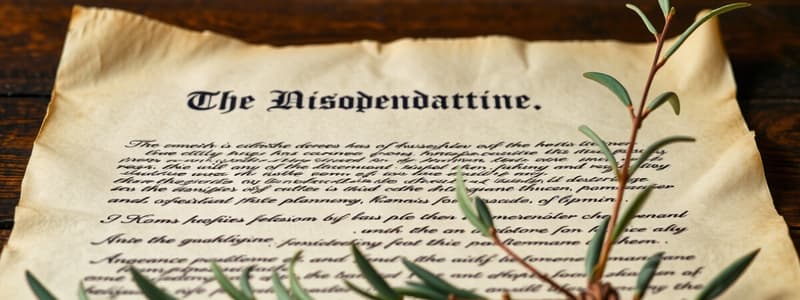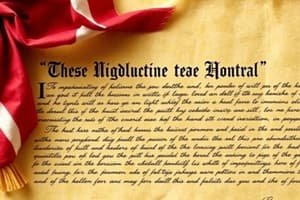Podcast
Questions and Answers
What did one of them say about monarchy?
What did one of them say about monarchy?
Monarchy should never provide just government for a nation.
What does the olive tree symbolize in the Olive Branch Petition?
What does the olive tree symbolize in the Olive Branch Petition?
Ancient symbol of peace.
When was the Olive Branch Petition sent and who wrote it?
When was the Olive Branch Petition sent and who wrote it?
July 1775, The Second Continental Congress.
To whom was the Olive Branch Petition written, how was it written, and what was its purpose?
To whom was the Olive Branch Petition written, how was it written, and what was its purpose?
Was the Olive Branch Petition successful?
Was the Olive Branch Petition successful?
What did the king call the colonists after the Olive Branch Petition was sent?
What did the king call the colonists after the Olive Branch Petition was sent?
What were many colonists worried about before becoming independent?
What were many colonists worried about before becoming independent?
How was the Olive Branch Petition different from Common Sense?
How was the Olive Branch Petition different from Common Sense?
When was Common Sense published and who wrote it?
When was Common Sense published and who wrote it?
What was Common Sense's stance on the king and parliament?
What was Common Sense's stance on the king and parliament?
For whom was Common Sense written and what was its purpose?
For whom was Common Sense written and what was its purpose?
Was Common Sense successful?
Was Common Sense successful?
Did the Olive Branch Petition and Common Sense present similar views of the monarchy?
Did the Olive Branch Petition and Common Sense present similar views of the monarchy?
How is Common Sense described?
How is Common Sense described?
What event was right before the drafting of the Declaration of Independence?
What event was right before the drafting of the Declaration of Independence?
After the skirmishes at Lexington and Concord, what was the situation regarding independence?
After the skirmishes at Lexington and Concord, what was the situation regarding independence?
How did the Olive Branch Petition and Common Sense differ in their approach towards King George?
How did the Olive Branch Petition and Common Sense differ in their approach towards King George?
What did Paine argue regarding the colonies' ties to Great Britain?
What did Paine argue regarding the colonies' ties to Great Britain?
Flashcards are hidden until you start studying
Study Notes
Olive Branch Petition
- An attempt by the Second Continental Congress sent in July 1775 to King George III.
- Symbolized peace, advocating for the cessation of fighting and restoration of pre-war relations.
- Written in a polite, respectful tone, urging the king to resolve conflicts without further hostilities.
- Failed as King George III refused to read it, labeling the colonies as "open and avowed Rebellion."
King George III's Response
- Declared the colonies traitors, intensifying conflict and changing the mindset of some colonists.
- Prior to the petition, colonists were worried about the implications of independence, fearing business loss and unsure of success.
- King's rejection of the petition was a pivotal moment, as he called for justice against those he deemed traitors.
Common Sense
- Pamphlet published in early 1776 by Thomas Paine aimed directly at colonists.
- Differed from the Olive Branch Petition in its fiery tone, arguing against the monarchy and advocating for independence.
- Successfully persuaded thousands of colonists that independence was essential for a better future, with over 100,000 copies disseminated quickly.
Impact and Significance
- Common Sense was crucial in shifting public opinion towards independence, emphasizing that colonists owed nothing to King George.
- Both documents, although differing in tone, criticized the monarchy and its policies, with the Olive Branch Petition being more diplomatic.
- Common Sense galvanized support and was published just months before the drafting of the Declaration of Independence.
Context of the Time
- One year after the initial skirmishes at Lexington and Concord, loyalty to Britain was still widespread among colonists.
- Many viewed their grievances as conflicts with specific policies rather than the British crown itself, highlighting the significance of the changing attitudes influenced by both pamphlets.
Studying That Suits You
Use AI to generate personalized quizzes and flashcards to suit your learning preferences.




